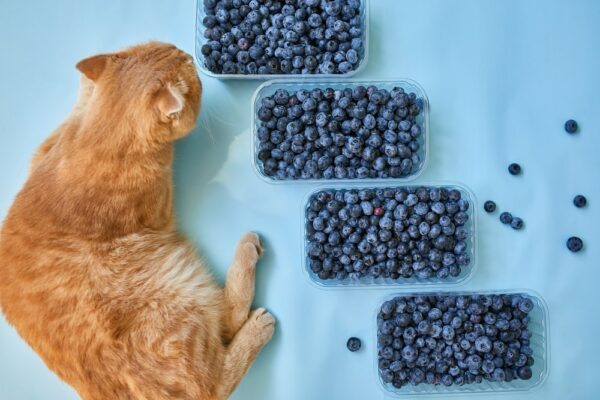Blueberries are one of the best sources of antioxidants in the world, and that means they’re also one of the healthiest fruits to eat.
But the question is: can cats eat blueberries?
There is no doubt that blueberries are one of the most popular fruits in the world, but some people are unsure of whether or not their cats can eat them.
Here’s what you need to know about feeding blueberries to your cats, both positive and negative factors to consider before offering these tasty treats to the kitty.
We’ll also tell you which other fruits are safe to feed to your cat and which ones should never be given as treats.
Want to learn more? Keep reading!
The One Thing Pet Owners Regret Not Doing Until It’s Too Late
Is your pet safe?
1 in 3 pets will need emergency veterinary treatment each year and it is estimated a pet receives emergency care every 2.5 seconds in the U.S.
The average cost of treating a broken bone in dogs is $2,700. Cancer treatments? Up to $10,000.
It’s why so many pet owners say their biggest regret isn’t the vet bill—it’s not having pet insurance when they needed it most.
Ask yourself: “If an unexpected $5,000 vet bill hit tomorrow, could I afford it?”
If the answer is no, it’s time to get covered.
Take a look at Lemonade. They have a great app that actually works, they have an instant chatbot that is faster and, dare we say it, friendlier than most companies’ “real” customer service and a quick scroll through Reddit will uncover… people are really vibing with this brand.
So go check them out and take a look. It takes less than a minute.
What Are Blueberries?
The blueberry is a round, slightly flattened fruit that is closely related to the cranberry. The blueberry grows in North America and is available in shops worldwide.
Blueberries are often labeled as a healthy food because of their high content of antioxidants and dietary fiber which have been linked to health benefits like reduced cholesterol and lower blood pressure.
What Kind of Nutrients Do Blueberries Have?
Blueberries are one of the most nutritious fruits you can find. They contain essential antioxidants, anti-inflammatory properties, and fiber that help with digestion.
Blueberries consist of:
- A powerful antioxidant called anthocyanin
- High levels of Vitamins C and K
- Quercetin (plant pigment) protects against inflammation, allergies, and cancer.
- An abundance of fiber and water content
- Iron, phosphorous, potassium, calcium, magnesium, manganese, and zinc
Can Cats Eat Blueberries?
Cats are known to be carnivores, but that does not mean that they cannot eat other foods as well.
The short answer is yes, cats can eat blueberries.
In fact, blueberries are non-toxic to cats and are one of the few human foods they can eat safely.
However, it is important to note that berries are not a substitute for an appropriate diet and should not be fed to your cat as a replacement for their regular food.
Cats are still carnivores and require protein from meat in order to thrive.
It is important not to overfeed your cat with berries because it can upset their stomachs or give them diarrhea.
Feed your cat berries sparingly and only in moderation so that they get the nutrients they need from their regular diet as well.
If a Cat Eats Too Many Blueberries, What Can Be the Effects?
It is advised that you give your pet blueberries sparingly. Blueberries have carbs, whether they are in the form of fructose or fibers.
One thing that your pet should absolutely not do is eat excess carbohydrates. When they eat carbs, the main issue they face is weight gain, as well as diabetes as a result of excessive sugar consumption.
The downside of excessive sugar consumption on a cat:
- Diabetes
- Pancreatitis
- Obesity
- Arthritis and mobility issues
- Heart problems
Diabetes
Diabetes in cats is one of the most common long-term feline health conditions. It’s caused when your cat eats too much sugar and their blood glucose levels get too high
If this goes on for a long time, it can eventually cause serious damage to the kidneys, heart, and other organs.
Cats with diabetes suffer from the following symptoms:
- Vomiting
- Lack of appetite
- Excessive thirst
- Frequent urination
- Weight loss
Pancreatitis
Pancreatitis is a painful and life-threatening condition in which the pancreas becomes swollen and inflamed.
When cats eat large quantities of carbs, their system is overloaded with sugars, which may make their system unstable.
To fight this, the pancreas releases a hormone called insulin that helps keep the glucose level balanced.
As a result of this extra burden on the pancreas, it may develop pancreatitis, which can be fatal if left untreated.
Obesity
Cats have an increased susceptibility to obesity when given sugary treats or an excessive amount of food that is not balanced.
Their caloric requirement is less than dogs and other mammals which means that they don’t need as many calories per day in order to maintain a healthy weight.
To prevent obesity, feed your cat a balanced diet and avoid sugary treats or foods that are high in fat or carbohydrates.
Arthritis and Mobility Issues
It is possible for a cat to develop arthritis and mobility issues as a result of excessive consumption of carbohydrates.
The reason behind this is that carbohydrates can lead to obesity which in turn can lead to lethargy in the animal. If the animal becomes lethargic it will not consume the necessary calories.
Lack of activity and calorie consumption can lead to joint degeneration and arthritis in the cat. In addition to arthritis, mobility issues may arise from a lack of exercise due to being overweight.
Heart Problems
Cats have a predisposition to heart problems because of their nature to consume too many carbs and not get enough exercise due to their indoor lifestyles.
Obesity also plays a role in heart issues because the heart has to work harder due to the weight of the animal.
Neutered and domesticated cats are particularly susceptible to these problems because they are less active than their counterparts that are allowed outdoors.
The signs of heart disease in cats can include:
- Difficulty breathing
- Increased respiration rate
- Seizures
- Stunted growth
- Acute paralysis of the hind legs
Is it Possible for Cats to Have Allergic Reactions to Blueberries?
It is very rare for cats to be allergic to blueberries, but it does happen. Signs of an allergic reaction to blueberries in cats include:
- Difficulty breathing
- Sneezing
- Coughing
- Vomiting
- Diarrhea
- Runny nose
- Watery eyes
- Itching
- Skin rashes
- Face swelling
Immediately contact your veterinarian if your cat shows symptoms of being allergic. However, if your pet doesn’t have any allergies or other health problems that would cause a problem with eating blueberries (i.e., pancreatitis), then you can probably feed them this tasty fruit on occasion.
Blueberries for Cats: How to Introduce Them?
If your cat has never eaten blueberries before, here are some tips to help them safely explore the flavor of this new food.
Consult Your Veterinarian
You should always consult your vet before offering your cat any new food, despite the fact that it is harmless for cats.
Calculate the Portions
Depending on your cat’s nutritional needs, weight, and overall health, you can determine how many blueberries he or she needs over a period of time. It is never advisable to exceed 10% of your cat’s total daily caloric needs with treats or snacks.
Prepare the Berries
This process starts with thorough washing, detaching the stems, and cutting the berries into smaller sizes before serving.
Monitor Your Cat
Cats are typically able to eat blueberries, but it is possible for them to experience gastrointestinal upset and diarrhea.
After feeding your cat blueberries, monitor their health and behavior for any signs of distress. If you notice any signs of discomfort, stop feeding the cat blueberries immediately.
Is it Necessary to Include Fruits in a Cat’s Diet?
It is often believed that cats need fruit in their diet because it provides a source of carbs and vitamins and minerals that meat cannot provide.
However, this isn’t the case because obligate carnivores can only derive nutrients from meat-based products and fruits are not necessary for their diet.
In general, treats or snacks should not comprise more than 10% of your cat’s daily diet, and fruit should only be offered occasionally as a treat.
Safe Fruits and Vegetables for Cats
Although cats require a lot of protein in their diets, they can also consume small amounts of fruit and vegetables, such as:
- Cantaloupe
- Pumpkin
- Bananas
- Apples
- Spinach
- Strawberries
- Carrots
Healthy Protein Snacks for a Cat
The nutritional benefits of protein snacks, like cooked chicken or tuna mixed with their favorite wet food, will provide your cat with the nutrition he or she needs without the sweetness of human treats.
You have many different options for a protein snack, for example:
- Chicken
- Lean beef
- Shrimps and prawns
- Sardines
- Lamb
- Cooked eggs
- Salmon
- Mackerel
- Tuna
Key Takeaways
- Cats can eat blueberries, but they should not be the only food you feed them.
- Though it is true that blueberries do not typically make cats sick, there is sometimes a rare occurrence where the berries can produce an allergic reaction.
- The carbs in blueberries may cause certain health problems in cats if they consume too many of them.
- It is best to consult your veterinarian before feeding any new food to your cat.
Importance of Pet Insurance
Pet insurance is a great way to protect your animal’s health. It can be hard to predict when an accident will happen, but with pet insurance, you’re covered.
There are a few different types of plans depending on your needs, and it only takes minutes to get coverage for your pet.
Some pet insurance companies will even cover 100% of veterinary expenses. So make sure to choose the best pet insurance plan for your furry friend.
Once you have a plan in place, vet bills will never be too high because they’ll already be covered by the policy.
It’s important that we all take care of our animals’ safety and well-being so they can enjoy their lives just as much as we do ours.
What Makes Genius Litter Different from Ordinary Litter?
Say goodbye to hauling heavy bags and hello to easy Genius Litter.
With our innovative non-clumping litter formula, you’ll need less of it. One bag of our disposable Genius Litter lasts up to a month, so you won’t need to refill the box as often and can save money on monthly costs.
One thing that separates us from traditional litter is that Genius Litter changes color to indicate when your cat has a potential health issue, so you can get them help before it becomes an urgent medical situation.
All you need to do is set up a delivery date with us each month, and rest easy knowing that Genius Litter will arrive at your doorstep every 30 days.
For a convenient solution for your cat, try Genius Litter today!
Why is Lysine so Important for Your Pet?
Protect your pet’s immunity!
Have you noticed that your cat is coughing, sneezing, and having rapid breathing? Or maybe he/she has been scratching more than usual?
These are all signs of a weakened immune system. One way to prevent this from happening is by using lysine supplements.
Lysine plays a key role in your pet’s immunity because it helps to regulate the immune system.
Without enough lysine, your pets will be more susceptible to illness because their immune system can’t fight off infections as efficiently.
When they are sick, they will also be less able to absorb nutrients and make use of other supplements that can help them feel better.
Give your pet the support they need. Our Lysine supplement provides essential amino acids to help support a strong immune system.
Order now to get 300 one-scoop servings or 150 two-scoop servings and don’t worry about expiry!
80% of Dogs Develop Arthritis or Joint Pain by 7 Years old – Here’s How to Protect Them
Most of us train our dogs when they are puppies to jump up on furniture. We think it’s harmless (and easier than always lifting them), but for dogs, couches and beds are very high compared to the size of their bodies.
Every time they jump it compresses their back and applies enormous force to their joints.
It’s no wonder that an incredible 80% of dogs experience arthritis or joint pain by only 7 years old.
Luckily, there is a vet-recommended solution.
It’s the PawRamp by Alpha Paw. An adjustable ramp that allows dogs to safely get on and off couches and beds. PawRamp makes joining you in bed or on the couch effortless and fun.
As a bonus, you can use code SAVE35 to get $35 off the PawRamp today.















